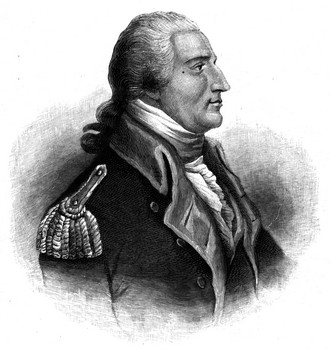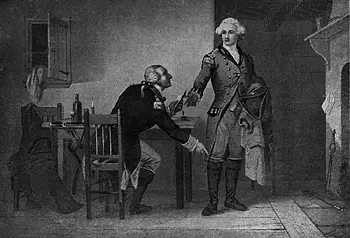Benedict Arnold: Two Sides of a Bitter Coin
Part 3: Final Choices Arnold spent a few months trying to heal his shattered leg, then spent the spring of 1778 in Valley Forge with the Continental Army. (He was one of a group of soldiers who pledged the first-ever Oath of Allegiance.) From Valley Forge, Arnold went to Philadelphia, to serve in his new post, as military commander of the city (appointed by George Washington).
The second thing that happened to Arnold was initially very happy: he met the woman who would become his new wife, Peggy Shippen. A young girl (she was no more than 18 when she met Benedict), she nonetheless had connections, including a famous father in Judge Edward Shippen and the interest of a British Major named John Andre. (Andre and Peggy were a couple for awhile.) Arnold and Peggy fell in love and married, all rather quickly. The more he learned about Peggy, the more Arnold discovered that she had many powerful pro-British friends and was really an enemy of American independence. Thus began the spiral for Benedict Arnold, from which his name would thereafter be synonymous with "traitor." His bitterness about being ignored, passed over for promotions, and relegated to military commander of a city instead of a group of soldiers boiled over when stirred by his new wife's anti-American sentiments and pro-British contacts. Arnold decided to change sides.
West Point was built on a strategically important site. The fort's cannons could keep ships from moving further up the Hudson River. Arnold thought that handing over West Point to the British would give them an entry into northern New York, a move that he hoped would allow British troops to link up with forces from Canada, divide the new American-French alliance, and perhaps make French troops leave for good. He never got the chance, for Andre was captured and identified as a spy, complete with a letter from Arnold in his pockets. Andre was hanged, and Arnold fled to the British side. The next in a long list of indignities to greet Benedict Arnold was that the British made him a brigadier general, a position with some power and influence, but paid him much less money than they otherwise would have because he had failed in his mission to turn over West Point.
Arnold tried his luck at shipping, in Canada, for a few years but had little luck. He suffered from poor health and large debts and died, relatively unknown, in 1801. First page > Rise to Fame > Page 1, 2, 3 |
|
Social Studies for Kids
copyright 2002–2026
David White



 Along about this time, two things happened that would turn Arnold on his fateful final course. France, after hearing of the American success at Saratoga, agreed to enter the war and fight against its old enemy Great Britain. Arnold found this development worrying because of his suspicions of French motives dating back to the French and Indian War.
Along about this time, two things happened that would turn Arnold on his fateful final course. France, after hearing of the American success at Saratoga, agreed to enter the war and fight against its old enemy Great Britain. Arnold found this development worrying because of his suspicions of French motives dating back to the French and Indian War. In 1780, Arnold won command of the U.S. Army fort at West Point. This was welcome news for his new circle of friends, which included Major John Andre, Peggy Arnold's former suitor. Andre was in direct contact with
In 1780, Arnold won command of the U.S. Army fort at West Point. This was welcome news for his new circle of friends, which included Major John Andre, Peggy Arnold's former suitor. Andre was in direct contact with  Determined to carry on, Arnold led British troops to victory in Virginia, capturing the important city of Richmond and its vibrant port. However, the surrender of General
Determined to carry on, Arnold led British troops to victory in Virginia, capturing the important city of Richmond and its vibrant port. However, the surrender of General 
